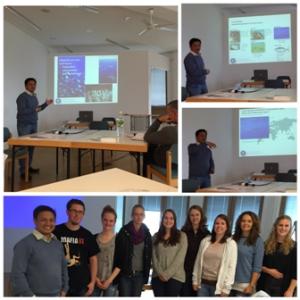Prehadi (23 years old, Graduate student of the Department of Marine Science and Technology (ITK), Faculty of Fisheries and Marine Sciences (FPIK) of Bogor Agricultural University (IPB) representing Indonesia, and Germany represented by Thea Hamm (25 years old), student of Master program of Kiel University, are doing basic research related to tropical marine benthic organisms response to the phenomenon of global warming. This research collaboration, conducted in March-December 2015, is fully funded by GEOMAR, one of the largest marine institutions in Germany.
March 2015 last month, Prehadi visited the city of Kiel, Germany for a full month for preparation related to the collaborative research plan to be carried – designing experiments and statistical principles that will be used. The basic questions to be answered in this study are how big the increase in temperature can be tolerated by tropical and sub-tropical marine organisms, whether there are similarities in the limits of tolerance by the tropical and sub-tropical organisms, and in which region organisms are more resistant to the rising temperatures. To answer these questions, a good experimental design is required and also attention to many environmental factors. The subject of the research is benthic organisms in the marine area, and this time it is represented by the anemone because it is known that benthic organisms are sessile (or settle on one place) organisms, making them very difficult to shift from the habitat when there is a change of environment.
After several months of studies, Prehadi is interested to study further what he is studying now related to the experimental marine organisms although previously he focused on and studied the marine genetics. The main reason for Prehadi to further study the experimental design is that the studies related to marine organisms experiments are still very far behind the other countries; it is evidenced by the lack of published journals written by Indonesian researchers and studies conducted in Indonesia. Besides, it is very difficult to find researchers in Indonesia that focus on the effects of global warming on marine organisms. (mtd)




